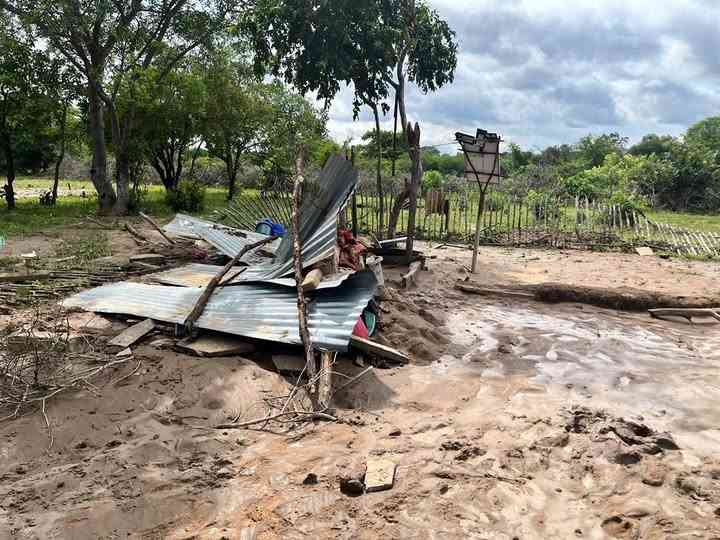
GOVERNMENT is establishing agro-village business units in Gokwe North and similar dry districts across the country to mitigate the effects of climate change and build community resilience.
Agricultural Rural Development Advisory Services Department provincial director in the Midlands province, Busiso Olga Mavankeni, said the agro-village business units were among community-led climate action models being implemented to boost food security and end poverty.
This development follows an investigation by Truth Diggers, which revealed that horticulture farmers in Gokwe North have reduced crop production, including tomatoes due to climate change.
The agro-village business units implement practical, low-cost and sustainable climate-smart agricultural strategies and are being spearheaded by the government in partnership with non-governmental organisations across the country.
In Madzivazvido in ward 28, two village business units have been set up with a solar-powered borehole having been installed as the communities warm up for a drip irrigation system.
“The government has introduced the village business unit concept nationally,” Mavankeni said.
“A village business unit has a one-hectare garden, a solar powered borehole, two 10 000 litre water tanks and drip lines.
- Teachers, other civil servants face off
- Veld fire management strategies for 2022
- Magistrate in court for abuse of power
- Vungu Dam water treatment and irrigation project takes off
Keep Reading
“Village business units enable production of horticultural crops such as tomatoes and vegetables, which are important to Gokwe North communities for nutrition security, income generation, food availability and stock feeds.”
Mavankeni said these were very important in Gokwe North because the area was arid.
“Having a village business unit gives the farmers an opportunity to produce all-year-round horticultural crops of their choice,” she said.
“The establishment of village business units also increases the chances for farmers to successfully produce their crops because of guaranteed water supply.
“The water supplied through the village business unit also benefits livestock.”
Mavankeni encouraged farmers to embrace climate smart agricultural programmes such as Pfumvudza/Intwasa.
Pfumvudza, launched in 2020 by the Agriculture ministry, promotes sustainable farming practices tailored for low-input, high-output food production on small plots.
“To ensure high production and productivity, farmers should adhere to all Pfumvudza principles — minimum soil disturbance, mulching and crop rotation,” Mavankeni said.
She said there was a need to adopt water saving irrigation techniques such as drip irrigation.
The provincial director, however, said inadequate high-volume water bodies were a hindrance to the setting up of irrigation systems in Gokwe North.
“Gokwe North has limited prolific water bodies as a result we only have the Vambe Irrigation Scheme, which is six hectares,” she said.
“Drip irrigation is prioritised in most irrigation projects targeted by the government in Gokwe North.
“However, there is a long-term plan to build Kudu Munyati Dam, which will result in the development of a proposed 5 000-hectare irrigation scheme in Gokwe North.”
On pests affecting crops, Mavankeni said government had established early warning systems on pest outbreaks through extension staff to enhance farmer preparedness.
“We encourage the use of pheromone traps supplied by the Agricultural Research Innovation and Specialist Services (ARISS) department through the Plant Protection Institute,” she said.
“Farmers are advised to source their tomato seedlings from a clean source and ensure early identification of Tuta absoluta for easy control.
“The government has also introduced drone technology and motorised sprayers to combat quelea birds.”
She said extension staff was encouraged to identify roosting sites for quelea birds and report to the ARISS department.
Mavankeni said farmers in dry areas such as Gokwe North were encouraged to produce traditional grains such as sorghum, pearl millet, rapoko, legumes, cowpeas ground nuts and Bambara, and crops such as sunflower that did well in arid regions.
Climate change and natural resources expert Obriel Nhachi said climate action interventions were most effective when farmers lead them themselves.
“The government can help by removing barriers — simplifying access to agricultural extension services, ensuring rural roads stay passable so that farmers can reach markets and providing basic weather information via SMS,” he said.
“Real change comes from the ground up. When a farmer sees their neighbour’s kitchen garden surviving drought while their maize fails, they learn faster than any policy paper could teach
them.
“The climate crisis demands this kind of immediate, practical innovation, not mere promises from Harare.”
*This article was published under the Voluntary Media Council of Zimbabwe Investigative Journalism Fund with support from the Friedrich Naumann Foundation.
*Truth Diggers is the investigative arm of Alpha Media Holdings, the publishers of The Standard, Zimbabwe Independent, NewsDay and Southern Eye as well as proprietors of HStv.









